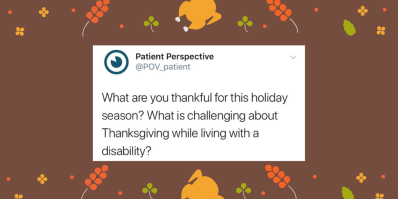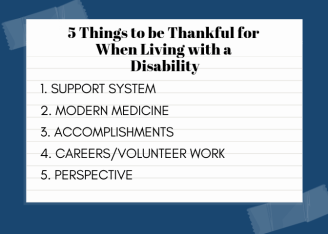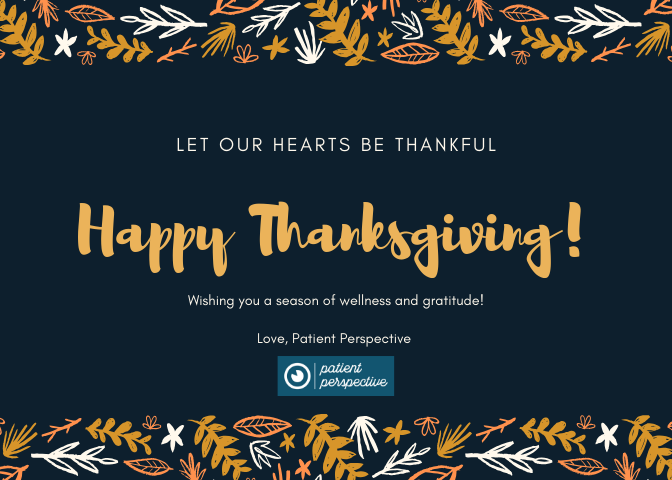Thanksgiving is a season of gratitude, love, and thanks. This gathering prepares us for the holiday season ahead of us. The traditional feast and family get together is a wonderful experience, but can be hard for those with disabilities. Keep in mind, there is much to be thankful for despite living with an illness or disability.
Patient Perspective on Twitter
On twitter, Patient Perspective tweeted asking followers what they were thankful for this  holiday season and what was challenging about Thanksgiving, while living with a
holiday season and what was challenging about Thanksgiving, while living with a
disability. I received an abundant amount of responses via direct messages. My followers explained their gratitude and what can make the holiday even more enjoyable.
Make sure you follow, @POV_patient on Twitter! Continue reading to learn about ways to improve the thanksgiving season and to hear about what these individuals with disabilities are thankful for. You may even have similar thoughts, I know I do.
5 things to be Thankful for When Living with a Disability

1. Support System
Having a support system has many positive benefits. These individuals can help encourage an individual when they are dealing with the stress of an illness. People like friends, family, neighbors, caregivers or coworkers can enlighten the hope that we all need when struggling. Thank you to all of you who support those with disabilities!
A patient and blogger, Lauren (@prettycouchpotato/ https://prettycouchpotato.com) says “I am thankful for all the amazing people I have met. I would have never have met them if I wasn’t ill.”
2. Modern Medicine
Modern medicine is something that every patient is thankful for. Having access to healthcare is so important for those who have disabilities. Individuals expressed their gratitude for their medical devices such as wheelchairs, feeding tubes, and insulin pumps. Medicine and those who practice in this field are sure to be on the list of those to thank.
I am thankful for the medication that helps me function each day.
-Anonymous Tweeter
3. Accomplishments
The holidays bring people together and strikes conversations between one another. It is important to acknowledge your family and friends accomplishments, despite their illness/disability. In the responses that I received, there was no lack in pride when patients commented on their accomplishments.
Brittany App says ” My first year of Graduate school, I missed over 100 days, had sepsis twice, was admitted in the hospital for 3 months and still graduated on time with Psychology Honor Society.
You can find Brittany on social media @brittanys_hope and even follow her service pup, @servicedog.jasmine
4. Career and Volunteer Work
Patients often spend time in the hospitals, infusion centers, and emergency rooms. Those who care-give for patients such as nurses, often inspire career paths for the ill or disabled. Ashly, a friend of mine, is currently studying to become a Registered Nurse. She has spent time volunteering her time as well to help aid those in need. Thank you to all of those who enlightened career paths for those who are ill!
” I know how it is to feel ill and to be sick. I am becoming a Registered Nurse because I want to be there for patients. I am thankful for the ability to study and to be on the path to becoming a Nurse.” -Ashly M.
“My struggles lead me to my career path of becoming an Occupational Therapist” Says Ashley also known as @chronically_muscial on Instagram
5. Perspective
Going through a challenging circumstance can change your perspective. It opens your eyes to the unimaginable. There is a lot to be thankful for when living with an illness, even with the uphills and downfalls. Thanks to the circumstances of living with an illness/disability!
“We are able to make small adventures important. Every we find something good even in challenging times. When I was younger, I worried about trivial things. I learned that dusting and scrubbing the night before Thanksgiving, certainly isn’t as important as being with the ones you love. You really gain an outlook.”
-Ann Widmar, The founders Mother
Aleigha Rankin states ” I’m thankful for learning and practicing empathy because of my illness. It has changed my perspective.”
Be sure to follow her on social media and her blog. @hiraethix // https://thecaneeffect.wordpress.com
5 Things to Improve on Around the Holiday Season for Those with Disabilities

1. Accessibility
Wherever you are hosting your holiday gathering, be sure to make sure that it is accessible for all of your guest. Stairs, rugs, tight spaces might all be hard for some people who will be in attendance. In addition, if the TV is on, turn on the closed captions for your hard of hearing friends.
Reach out to your guest prior to the gathering and see how you can make the event more accessible. Those who need accommodations do not want to face the struggles of inaccessibility. Being proactive is the way to go!
“I try really hard to not put her in a position that I know will be inaccessible, if I can help it. I am very thankful for all the amazing people that have been brought into our lives due to Bea’s diagnosis.”
-Laura O- Mother of Bea, Disability Advocate, Accessibility Advocate
2. Transportation
Traveling to far destinations can be difficult for those who are ill. Driving or flying can trigger symptoms. Depending on where one lives, the weather may also effect someones condition. It is important to discuss with your family and friends what suits their needs best. If you are aware of someones condition and they happen to not make it to the holiday gathering, be sure to let them know that you understand.
“Traveling is challenging. If my Autoimmune Disease is flaring, it means that my service dog alerts more. It is hard. I want to go, but physically I can’t. I’m thankful for those who understand that.” -Allie
3. Food/ Sensory Adaptations
Allergies are a nightmare when it comes to the Thanksgiving feast. The typical dishes like pumpkin pie or stuffing may contain ingredients like cinnamon or gluten. Cinnamon and gluten are two examples of common allergens. When another person is preparing food for someone with allergens it is hard to know how they prepared it and with what ingredients. If you are the host of the Thanksgiving meal for your family, be sure to ask about allergens. If you have allergens, don’t be shy to bring your own food.
“It is better for me to be safe than sorry when eating because of my allergies.” – Founder, Emma
Individuals who have Autism, may also have sensory integration issues causing them to dislike the typical Thanksgiving foods. Some may even feel overwhelmed by the silverware clanking. It is important to take into account the individuals who have Autism and how to better prepare your house for their needs.
Plastic silverware, offering other meals, dimming the lights may help ease the Thanksgiving experience for these individuals. It is crucial we improve the experience for those who need sensory adaptations.
“A lot of food goes on one plate, mushy foods, different textures all make the experience stressful. My mom makes me buttered noodles instead.”
-Jesse, Autism Advocate & Blogger ( @jesse.emily // coffeeandneurodiversity.com/ )
4. Communication
Meeting with extended family is common this time of year. Individuals you don’t typically see are gathered together and while communicating may seem harmless, it is challenging for some. Small talk, complex questions and wrapping a years worth of information into a couple minuets causes stress for some. When asking individuals questions about their life situations or health, be sure to be supportive. Think twice about the way you speak and the way you word things towards others. Be kind!
“Sometimes being with extended family, stresses me out. The day brings out unwanted anxiety because of the small talk.”
-Monica, Mental Health Advocate & Fighter
5. Perspective
Everyone can always improve their attitude around the holidays. Allow this season to be a reminder of everything to be thankful for. There are areas where the world can improve to make life more accessible and smooth for those with disabilities. Do your part this thanksgiving to help ease it for someone else. Be thankful & give thanks for your perspective.
Kali says ” Something that I can be thankful for, but is hard, is remembering to be thankful for the abilities I do have despite my disability.”
What are you thankful for? Be sure to comment and follow Patient Perspective on social media. Patient Perspective is thankful for you, her support groups, friends in the fight and those who work to make life more accessible.


